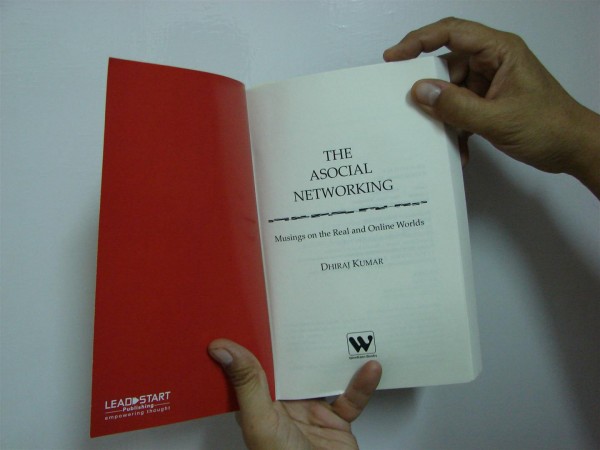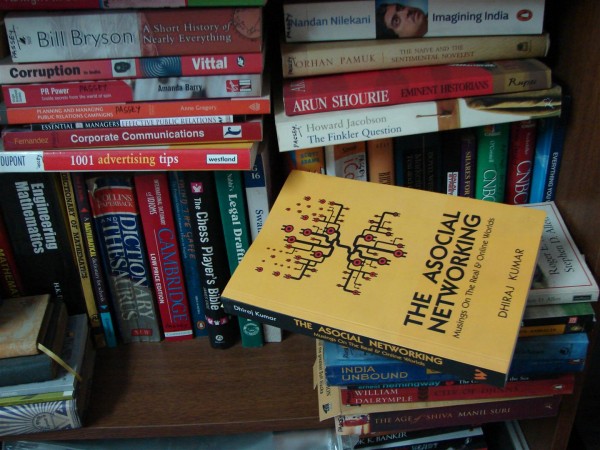Unconnected and Unrepentant. Review of ‘The Asocial networking.’
by Arvind Passey on Apr 20, 2012 • 2:29 PM 3 CommentsFrankly, I loved the book immensely because it gave me all the reasons to have a hearty hoot after every few hundred words… and mind you, this book isn’t in the comedy genre at all. It is supposedly a serious treatise on the state of the social networks today. The book claims to take you ‘on a mind-boggling and nerve-crackling tour of the virtual world on networking’ and I was indeed heartily crackling with undisguised laughter by the time I finished reading it.
The sub-title of the book ominously declares on the cover that the pages are poised to develop into ‘Musings on the real and online worlds.’ I am, therefore, thankful to Dhiraj Kumar, the author, for this warning as the absolutely unconnected and unrepentant 150 chapters did not pounce on me as some unexpected mugger in a dark alley! Let’s review the objective elements first…
Title: The Asocial Networking
Author: Dhiraj Kumar
Publisher: Wordizen Books (www.leadstartcorp.com)
ISBN: 978-93-81115-87-9
Price: Rs 195/-
As I cursorily glanced at the list of chapters I was rather perplexed to find only Facebook featuring in most and this was confirmed as I began reading the book. As I went from one chapter to another the words and even the ideas began resembling the untutored ramblings of a confused mind putting up highly opinionated status updates on randomly chosen aspects of social networking! Mercifully, the author isn’t as pointless and bland as the originators of those updates I am talking about, but certainly makes supposedly barbed statements without realising that they’re already riddled with bullet holes. Even Sujata Parashar declares in her review of the book that ‘there are areas in the book (to my delight), that can be hotly debated…’ implying gently that the ideas expressed may not really be backed by serious research.
No wonder then that even as I was reading the book I had already decided to have these two sub-sections in my review:
- Absurd observations
- Irrational conclusions
- Obfuscating meanderings
Absurd observations
The book actually dwells mainly on Facebook which is the basis of all absurdities if one projects just this one social network as the heart, soul, and body of all social networking anywhere. Even Amit Gupta writes in his review of the book that it ‘is nothing but a BIG over-reaction on the impact of social networking (specifically Facebook) on our lives.’ I really want to inform Dhiraj Kumar that this overt inclination on just Facebook is one of the major undoing of this book. He seems to have conveniently forgotten that social networking is a phenomenon much deeper than just this one network. The entire world of micro-blogging and blogging are an intrinsic part of it. It isn’t limited to Facebook, Orkut, Linkedin, and Twitter, but also includes Google Plus, Flickr, Picasa, YouTube, Tumblr, Preposterous, Klout, Blogspot, WordPress, Blogger, Pinterest, Wavii… and the list is increasing every day.
However, even though the author chooses to stalk only Facebook, his observations tend to be mesmerizingly absurd! Just read what the author concludes on various aspects and effects of Facebook:
‘People who change the photograph in their profile less frequently are likely to stay more loyal to their partners than those who have the compulsion of changing their photograph every other fortnight.’
‘There will no longer be any ‘personal life’. People will get so used to knowing what others are doing that they will start losing any interest in their own lives.’ Anyone will surely read such lines twice before succumbing to uncontrollable giggling…
‘There will also be petty competition all around.’ Competitiveness, my dear author, is an inherent feature of the human mind and, if channelled properly, helps people restructure and realign for maximal gains. There is nothing ‘petty’ about it… and, anyway, the social networks aren’t deliberately promoting a ‘petty’ sub-culture.
The author writes at some point in the book that ‘there are lakhs and lakhs of coders doing routine jobs of maintenance, support or business process outsourcing in the third world and developing countries. Most of them are enterprising and motivated enough to start their own venture. Most of them, in fact, have their business plans. But in the absence of any platform and monetary assistance, these ideas have not seen the light of the day.’ Well, the genuine enterprising souls do nurture vision and get up to create the right platform for themselves… thus if we take the author’s philosophic incursions too seriously, every clerk in the Indian bureaucracy would want to be a Secretary in the PMO and every infantryman, a General!
Obviously, the author has conveniently forgotten that observations are supposed to be acute and not absurd!
Irrational conclusions
Numbers are always impressive and do lead to a rather confident state where authors can gloat about interpretations… because all interpretation of statistics is dominated by a very sublimely evolved game-paly that only the experts have the liberty to indulge in. Certainly not first-time authors who gleefully attempt to wring the life out of Facebook by cooking up numbers without telling us where they came from.
‘If there are newly posted photos of a newly-wed couple, who have recently celebrated the bliss of marital union in a place far from the reach of the common man – 40 Likes along with 30 congratulatory Comments is almost guaranteed.’ Phew! What was this supposed to be… a masterpiece in statistical interpretation giving readers some valuable insights into the psychology of communication? There are other gems that Dhiraj Kumar reveals:
‘80% of new status messages receive 80% of the ‘Comments’ and ‘Likes’ within 15 hours of their uploading.’
‘Photo albums and videos take up 80% of our active time on Facebook, while the other 20% is distributed amongst Comments, Status messages and other things.’
‘Will networking facilities continue to be available free of cost? I doubt it,’ writes Dhiraj Kumar. And what makes him reach this sweeping conclusion is not backed by any study or research or authentication by any known expert in communication and networking. So, what makes Dhiraj Kumar conclude with such confidence? His IIT background? This, in fact, makes me think twice about praising an IITian now.
Obfuscating meanderings
Manu Agrawal, another reviewer of the book opines in his review that the book ‘tends to get a little verbose in parts where a lot of non-familiar words are being used which might put off some readers. I also felt that the format and structure could have been better defined.’
Chapters in the book randomly choose one aspect of Facebook, make inane observations, and fill up pages with irrational conclusions before skipping merrily to another absolutely unrelated aspect to repeat the performance! Midway into the book, the author is seemingly fed-up of his tirade on Facebook and quietly enters the domain of tech fiction… which is good as the ideas expressed here experience a quantum jump in hilarity! Readers thus come face-to-face with the idea of having ‘a profile that is invisible to others but has the power to accost anyone without them having any clue whatsoever.’ Even I’m clueless to what the author wanted to say!
Conclusion
To tell you the truth it took more time writing this review than it took to read the entire book! I realised that the best thing about technology is that it provides so many the opportunity to write tripe and get away with it… look at all the authors who lean on tech-related themes and churn bin after bin of fiction that publishers thrust on unsuspecting readers as ‘best-selling’ fiction… or see the number of absolutely clueless tech-bloggers who trawl the net to find the latest in gadgetry and just pass on specifications disguised as ‘product review’!
In all fairness, allow me to end this review with another entertaining conclusion of the author. He writes: ‘Your GTalk shows a list of other insomniacs, mostly guys. (ROFL!!) I am at my wits end to discover what all these people are doing in the middle of the night. (Come on Dhiraj, why would you want this information?) In addition, most of them have ‘available’ signals glaring in green, thereby drawing the most poignant of emotions from me.’ The author forgets that one can remain online 24×7 and yet not be there actually… that’s the wonder of smartphones and the rather irritating habit of leaving the PC ‘on’ throughout the night with all open windows still active!
The language, expressive metaphors, quaint turns of phrases are conspicuous by their absence… but then this book never even tries to prop itself as a literary masterpiece. It began with the aim of analysing the social networking as it exists today through ‘musings’ and actually remains just that. The musings though are quite amusing! Read the book, I’d say and you’ll know all that no one really knows about Facebook…
Arvind Passey
20 April 2012











3 comments
Sulekha says:
Apr 21, 2012
Thank you for the review. One thing this book provided you with is some genuine laughs, I am guessing 🙂 going by your post. Just when I was mustering up enough courage to write my first romantic fiction 🙁
Arvind Passey says:
Apr 24, 2012
Do write your romantic fiction… hope you overlook my reputation of a tough reviewer and allow me to review your work! 🙂
Arvind Passey says:
Apr 22, 2012
Do write your romantic fiction… hope you overlook my reputation of a tough reviewer and allow me to review your work! 🙂